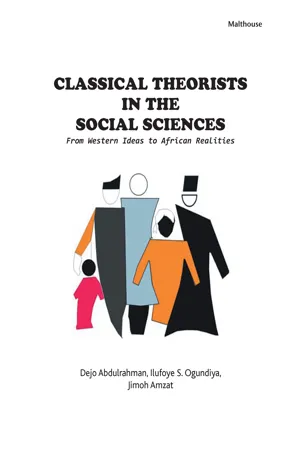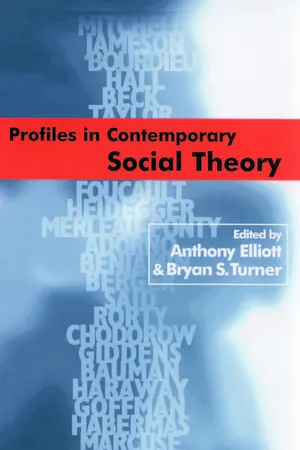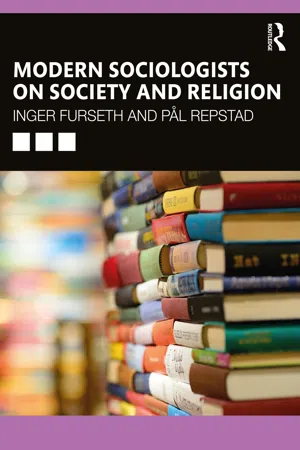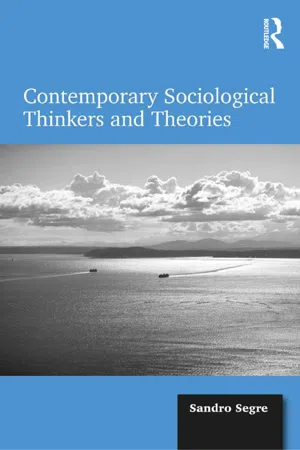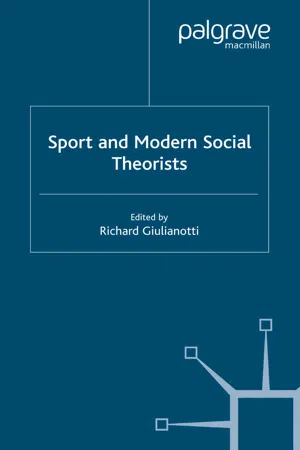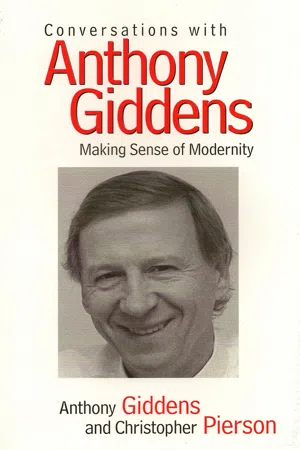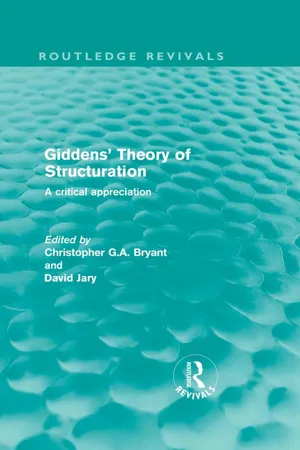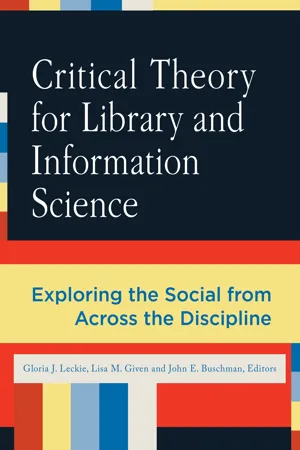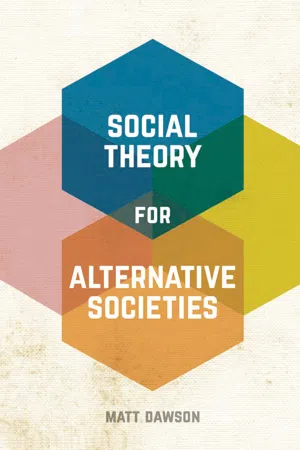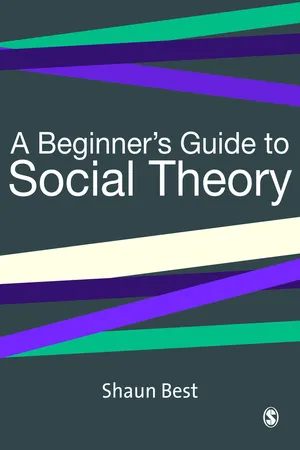Politics & International Relations
Anthony Giddens
Anthony Giddens is a prominent sociologist known for his theory of structuration, which explores the relationship between individuals and society. He has made significant contributions to the study of globalization, modernity, and social theory. Giddens' work has had a profound impact on the fields of sociology, politics, and international relations.
Written by Perlego with AI-assistance
Related key terms
1 of 5
11 Key excerpts on "Anthony Giddens"
- eBook - ePub
Giddens and Politics beyond the Third Way
Utopian Realism in the Late Modern Age
- P. Kolarz(Author)
- 2016(Publication Date)
- Palgrave Macmillan(Publisher)
Introduction: Anthony Giddens – Social Theory and PoliticsAnthony Giddens is a major figure in the discipline of sociology, with impressive breadth of scope and influence. His theory of structuration provided an essential approach for the study of social transformation, especially in complex organizations, and presented a possible solution to several long-standing problems in social theory, notably including how to coherently engage in sociological enquiry with due attention to both structure and agency. His analysis of late modernity put the term ‘globalization’ firmly on the sociological map and shaped debates about the distinctiveness of the present age, providing the terminology and descriptive foundations for research on individualization, challenges to tradition and individuals’ self-understanding in the global age. His breadth of expertise has helped establish both his early expository works on classical sociological theory as well as his later sociology textbooks as standard reading for anyone entering into sociological endeavours.Outside academic circles, Giddens is best known for his political move in the mid 1990s. His Third Way1 was a key influence on centre-left governments across the globe, though most clearly on the UK’s New Labour government under Tony Blair. Promising a renewal of social democracy beyond left and right, and suited to the changed nature of contemporary societies, his thoughts helped shape the political agenda and lent intellectual clout to centre-left endeavours at the turn of the twenty-first century.The majority of his career was rooted in academia. Following completion of his master’s degree from the London School of Economics (LSE), his professional academic career began in 1961 at the University of Leicester and included brief periods at Simon Fraser (Vancouver) and UCLA. In 1969, he was hired by the University of Cambridge, where he spent the bulk of his professional life. Subsequently, he moved towards the boundary between the academy and politics: following appointment as director of the LSE in 1997, he penned The Third Way - eBook - PDF
Classical Theorists in the Social Scienc
From Western Ideas to African Realities
- Dejo Abdulrahman(Author)
- 2023(Publication Date)
- Malthouse Press(Publisher)
26 Anthony Giddens Structuration Theory and Modernity Saheed Akinmayọwa Lawal Introduction As a social theorist, Anthony Giddens’s works have transformed society, human understanding of social life and offered insight into the nature of social realities in the 21 st century. Anthony Giddens is British foremost sociologist that has gained international recognition based on his scholarly contribution to sociological discourse. At the age of 37, his work became internationally recognised and subsequently several of his works have influenced the nature and character of doing sociology across the world. He is globally known for his “Structuration Theory”, in which he engaged in a synthesis of two main sociological perspectives that focused on macro and micro realities. For Giddens, to understand social life, both structures and actions must be harmonised. At the age of 23, Giddens began his academic career. He obtained his doctoral degree in 1974 from King’s College at the University of Cambridge. In an academic career that lasted over 40 years, Giddens published at least 34 books, over 200 journal articles, book chapters, and conference proceedings. In 1985, he co-founded Polity Press, an academic publishing company. Giddens held several positions across different universities of which from 1996 to 2003 he was the Director of the famous London School of Economic and Political Science (LSE). Today, he is known as Sir (Professor) Anthony Giddens as he has been knighted by the Queen of England and he occupies a seat in the British Parliament (House of Lords). Sir Anthony Giddens is a global icon on global issues and his works of globalisation continue to shape and reshape the understanding of how “local events are shaping global issues and how global issues are affecting local events”. Sir Anthony Giddens is a social theorist whose work on “Structuration Theory” and “Modernity” is the focus of this chapter. - eBook - PDF
- Anthony Elliott, Bryan S Turner, Anthony Elliott, Bryan S Turner(Authors)
- 2001(Publication Date)
- SAGE Publications Ltd(Publisher)
26 Anthony Giddens ANTHONY ELLIOTT BIOGRAPHICAL DETAILS AND THEORETICAL CONTEXT A nthony Giddens stands out as one of the most signi®cant British social theorists of the postwar era. His writings on the classical sociological tradition, as well as his inter-pretations of contemporary social theory, have had a profound impact on concep-tual debates in the social sciences over recent decades. Especially in social and political theory, Giddens has expanded the terrain of debate by interpreting, de-constructing, and reconstructing such traditions as structural-functionalism, interpretative sociology, critical theory, ethnomethodology, systems theory, psychoanalysis, structuralism, and post-structuralism. However, the contribution of Giddens to social theory rests on more than his capabilities as a ®rst-rate hermeneuticist. For, above all, he is a `grand theorist', a sociologist whose con-tributions rank in importance alongside the writings of theorists including Parsons, Habermas, and Foucault. Giddens's structuration theory is a richly textured analysis of the late modern world, with particular emphasis upon processes of social reproduction and political transformation. The extensive breadth of Giddens's social theory has been employed to illuminate social, cul-tural and political research, although the precise relationship between structuration theory and empirical sociological research is contested (see Clark et al., 1990). Certainly Giddens's own research con-cerns, like his theoretical interests, are very wide-ranging ± stretching from his work on modernization and modernity to his analysis of sexuality and intimacy to his more recent work on the develop-ment of a `Third Way' or `radical centre' as a means of managing global capitalism with greater equity and freedom. Giddens was born on 18 January 1938 in Edmonton, north London. - eBook - ePub
- Inger Furseth, Pål Repstad(Authors)
- 2021(Publication Date)
- Routledge(Publisher)
7 Anthony GiddensFrom sociological syntheses to political advice
DOI: 10.4324/9781003181446-8Anthony Giddens (1938–) began his academic life as a theoretically interested sociologist, but became increasingly active as an administrator, and not least as a political commentator and adviser. His most significant contribution to sociology is his attempt to build a bridge between structure-oriented and actor-oriented sociology. He analyzes critical features of Late Modernity and introduces self-reflexivity and individualization to the analysis on the decline of traditionalism. One can divide his work into several phases: first, some empirical studies, before a period of critical analyses of sociological classics; next, a distinctive design of the interplay between agents and social arrangements. From about 1990 he explored the consequences of modernity for society and individuals, and finally came a phase in which Giddens became politically involved and wrote about current societal problems, with an increasingly international perspective.Giddens has made a long journey socially, from a middle-class upbringing in London, where his father was a clerk in London Transport and his mother a housewife, until in 2004 he became Lord Giddens with a seat in the Upper House for the Labor Party. He has repeatedly teased in interviews that he started studying social sciences because he did not have good enough grades to get into philosophy. At the bachelor’s level, he probably had as much psychology as sociology in his curriculum. His interest in individual agents’ room to maneuver in society and how individuals adapt to late modern society may reflect these early studies. Drawing direct lines from life to work seems to have relatively limited interest in this case, however. Nonetheless, some reviewers of Giddens’ work point out that he went into therapy for several years around 1990, and that this experience may have informed such a book as Modernity and Self-Identity (1991).1 - eBook - ePub
- Sandro Segre(Author)
- 2016(Publication Date)
- Routledge(Publisher)
6 Anthony Giddens DOI: 10.4324/9781315573946-6Preliminary Remarks
Anthony Giddens (b. 1938), one of the most famous contemporary sociologists, taught at Cambridge University and was at the head of the London School of Economics before retiring from academic teaching.1 During the 1970s, his works dealt with some of the most important classical authors in social science, such as Marx, Weber and Durkheim, claiming their relevance in contemporary sociology and sociological theory (Giddens 1973 ). We shall, however, not dwell here on these works, considering their introductory nature, in the first case; and in the second case, because they are preparatory to his theory of structuration, for which Giddens is best known. We prefer instead to focus on other coeval and subsequent works. In the 1970s, and afterwards, Giddens’s investigations addressed also to several formulations of this theory and to issues referring to the epistemology of social science. In the 1980s, 1990s, and in the first decade of this century, Giddens explored the themes of modernity and globalization, and their consequences on individuals’ identity and social relations. Our exposition follows this line of studies and theoretical considerations, and completes it with some additional information on the reception of his works.1 Details and information on Giddens’s life and intellectual career, provided by the author himself, can be found in Giddens and Pierson 1998 : 28–51. Several and mostly critical introductions to his thought are available. See, in English, Craib 1992 ; Kaspersen 2000 ; in Italian, see Di Meglio 2002 .The Field of Study and the Tasks of Sociology
As Giddens argues in the first chapter of his Sociology (1983), this branch of knowledge mainly deals with institutions and the conditions of their change in advanced societies. He adds that the study of sociology should make use of sociological imagination, that is to say, it should focus on history, anthropology, and critical theory, the latter in the sense of asking ourselves what social changes are desirable and how is it possible to achieve them. Nonetheless, as Giddens remarks in other works, what we call “social theory” is marked by “disagreement on absolutely essential matters: i.e. what should its field of study be and what procedures should it consider correct” (Giddens and Turner 1987 - eBook - PDF
- Richard Giulianotti(Author)
- 2004(Publication Date)
- Palgrave Macmillan(Publisher)
129 8 Anthony Giddens: Structuration Theory, and Sport and Leisure 1 John Horne and David Jary For my sins, I am a Spurs supporter (Giddens, 1998) Introduction: Anthony Giddens, a global sociologist Anthony Giddens has been described as ‘the most prominent British sociologist of our time’. For Lemert (1999, p. 183), ‘he may well be the sociological social theorist who has most radically, and successfully, revised the language of social science’. Since 1971, Giddens has written or edited over 30 books. There are literally thousands of articles and chapters, as well as around a dozen full-length books, discussing and applying his work and he has become the most cited contemporary sociologist. His work has been taken up and applied across the social sciences. His conception of ‘The Third Way’, influenced the ‘New’ Labour Government of Tony Blair and has been courted by Former US President Clinton and an array of European leaders. In 1999 he presented the pres- tigious Reith Lectures on BBC Radio on the theme of globalization. It is apparent that Giddens has established himself as a prominent ‘public intellectual’ and a world sociologist (see also Bryant & Jary, 2000). In this chapter we set out to consider the existing and potential contribution of Structuration Theory and the writings of Anthony Giddens to under- standing the role of sport and leisure in late modern, global society. Anthony Giddens was born in 1938 in Edmonton, North London. His Masters thesis at the London School of Economics was on ‘Sport and Society in Contemporary England’. He then joined the Department of Sociology at the University of Leicester – where, coincidentally, Eric Dunning and Norbert Elias, later to become prominent for their contri- bution to the figurational analysis of sport and leisure, were also in 130 Giddens: Structuration Theory, and Sport and Leisure post. - eBook - ePub
Conversations with Anthony Giddens
Making Sense of Modernity
- Anthony Giddens, Christopher Pierson(Authors)
- 2013(Publication Date)
- Polity(Publisher)
The Sociology of Anthony Giddens: An Introduction
Martin O’BrienAnthony Giddens is one of the leading British sociologists of the post-war period. His writings span more than three decades of social and political change and have been at the forefront of the development of sociological theory and practice in the 1980s and 1990s. His interpretations of the classical sociological traditions have been a central pillar of much undergraduate and postgraduate teaching in sociological theory for twenty years (and continue to be so) and his imaginative reconstruction of sociology’s central concerns has stimulated academic debate and intellectual controversy in equal measure. He is an agenda-setting social theorist, a virtual one-man publishing industry, and a political philosopher of growing influence, and he has now taken on the professional challenge of directing the London School of Economics and Political Science in the uncertain era of the first Labour government since the 1970s.In introducing the extraordinary breadth of Giddens’s thinking to the new reader, I will focus on the outlines of his overall project, rather than on the critical details of any of its specific aspects. In particular, I will emphasize the connections between the different strands of his diverse output in order to provide a conceptual map of his theoretical and philosophical thinking. In this way, I want both to give a sense of the importance of his work and to disclose some of the critical questions that his reconstruction of sociology raises. I begin with some comments on Giddens’s understanding of the discipline of sociology before going on to sketch in some of the main contours of his work.The sociological enterprise
According to Giddens, sociology is a special kind of intellectual discipline. Unlike physical scientists, a sociologist seeks to understand a world that is already understood by its members. The ‘objects’ of sociological inquiry – what people say and do, what they believe and desire, how they construct institutions and interact with each other – are unlike the objects of natural sciences, such as physics, chemistry or biology, in so far as people’s actions and interactions, their beliefs and desires, are a central feature of the world that the sociologist investigates. Moreover, this world cannot be reduced to one ‘correct’ set of meanings or explanatory system. The social world is irreducibly characterized by competing and sometimes conflicting frames of meaning, understandings, and patterns of belief. When physicists dispute with each other about whether (and why) the universe is expanding, they are disputing the single, unique cause and character of the basic physical relationships between energy and matter. When sociologists dispute with each other about whether (and why) society is divided by relationships of class, gender, ethnicity or personality, they are disputing the complex intersections between different layers of social experience and action. Sociologists must develop alternative kinds of explanation for each of these social forces because there is not one unique cause and character of the basic relationships between individuals and society. - eBook - ePub
Giddens' Theory of Structuration
A Critical Appreciation
- Christopher Bryant, David Jary, Christopher Bryant, David Jary(Authors)
- 2014(Publication Date)
- Routledge(Publisher)
Chapter one
Christopher G.A. Bryant and David JaryIntroduction: coming to terms with Anthony GiddensThe need for a critical appreciation
The world of sociology does not know quite what to make of Anthony Giddens and his theory of structuration. There are a number of reasons for this. For a start he has written so much -twenty-three books alone between 1971 and 1989 (eleven sole-authored, four sole-edited, four joint-edited and four collections of his own articles and essays) – that it is difficult to take it all in. Many readers are also discouraged from trying to keep up with his output by the evident repetition (although most items do contain something novel if one cares to look closely). There is also a reluctance in some British quarters to concede that we have a star in our midst, so habituated have we become to the notion that the big names, especially in theory, are always foreign – first European (Spencer apart), then American, now, more often, European again. There has also been uncertainty as to both the originality and the utility of structuration theory, countered by a belief that there must be something to be said for the product of someone with such a command of languages (especially French, German and Italian), and such a knowledge of other disciplines (psychology, philosophy, linguistics, geography, history, politics and economics in particular), who can lecture so fluently without notes, and who can also find time to join with others to start a major new publishing house (Polity Press) and establish the first new faculty in the University of Cambridge for over half a century (Social and Political Sciences). Doubts about this or that may remain, but the scale of the enterprise and the virtuosity of the man compel respect.In Chapter Eight Giddens affirms that structuration theory is the label he attaches to his ‘concern to develop an ontological framework for the study of human social activities’ (p. 201). Ontology here refers to ‘a conceptual investigation of the nature of human action, social institutions, and the interrelations between action and institutions’ (ibid). The originality and utility of structuration theory are matters to which we and our contributors will return. For the moment let us just say that we believe it to be a considerable achievement in social theory that deserves our critical appreciation. But what does Giddens himself claim for it? Here he displays a curious ambivalence that may well not have helped its reception. On the one hand, he presents it as an approach to social science that avoids the dualisms of subject and object, agency and structure and structure and process, which have so bedevilled other social theories. On the other hand, he makes no exclusive claims for it and he clearly has no wish to impose it on anyone; he believes it provides a basis for good sociology, but does not believe it provides the only basis for good sociology. It is an approach that has been hammered out with great single-mindedness at least since New Rules of Sociological Method (1976a), and arguably longer. Yet those who submit to the rigours of the major ‘summation’ of structuration theory in The Constitution of Society (1984a) find that it is possible to be a structurationist without knowing it in so far as empirical studies there cited in illustration of its principles and value were done by others without reference to it; those who turn to the recent co-edited overview of leading theoretical traditions and trends, Social Theory Today (1987b), find an endorsement of post-empiricism in the ‘Introduction’ but no claims for structuration theory as such; and those who work with his vast new textbook, Sociology - eBook - PDF
Critical Theory for Library and Information Science
Exploring the Social from Across the Disciplines
- Gloria J. Leckie, Lisa M. Given, John E. Buschman, Gloria J. Leckie, Lisa M. Given, John E. Buschman(Authors)
- 2010(Publication Date)
- Libraries Unlimited(Publisher)
The chapter concludes that GiddensÊ ideas have greatly informed LIS research, and his work should continue to do so in future. GIDDENS AND STRUCTURATION Born in 1938 in London, Anthony Giddens was educated at Hull College (BA,1959), the London School of Economics (MA, 1961), and KingÊs College (PhD, 1974). Giddens 120 CRITICAL THEORY FOR LIBRARY AND INFORMATION SCIENCE began his academic career in 1961 at the University of Leicester and in 1969 moved to the University of Cambridge, becoming a professor of sociology in 1989 (Bryant and Jary 1991). During this time, he developed structuration theory, the focus of this chapter, in a series of books. Between 1997 and 2003, he was the director of the London School of Economics where he is currently a professor. In 2004, Baron Giddens took a seat in the House of Lords with a life peerage. GiddensÊ scholarly output is voluminous; since 1971 he has published more than 40 books (mostly sole authored), eight edited collections, and written more than 200 ar- ticles, essays, and reviews. He is one of the most widely known and influential living sociologists and his thinking has shaped theory and research in his home discipline and many others, for example, nursing (Hardcastle, Usher, and Holmes 2005), organiza- tional studies (Pozzebon and Pinsonneault 2005) and information systems (Jones and Karsten 2008; Rose 1998). Rob Stones (2005) argues that when considering empirical research, structuration theory has been an overwhelming success as scores of researchers have found that its concepts have allowed them to gain critical purchase on empirical phenomena in fields as diverse as accounting systems, archae- ology, demography, organisational and political culture, the sociology of technology, the manage- ment of inter-firm networks, migration studies, the analysis of sport and leisure, and of gender and patriarchy (2). - eBook - PDF
- Matt Dawson(Author)
- 2017(Publication Date)
- Red Globe Press(Publisher)
Come 1969, Giddens left Leicester to join Cambridge, where he was central to estab-lishing sociology at a university traditionally reluctant to accept it. Indeed, it remained so, with Giddens’ application for promotion to reader being rejected nine times. During this time period, Giddens’ work focused primarily on two fields: the exploration and critique of the ‘classics’, most notably in his work on Marx, Durkheim and Weber (Giddens 1971), and the development of his own structuration theory, which attempted to combine structure and agency (Giddens 1984). He stayed at Cambridge until 1996, at which point he left to become the director of the LSE (see Bryant and Jary 2001 for a full biography). Come 2004 he entered the House of Lords as a peer for the governing Labour Party and took the title Baron Giddens of Southgate in the London Borough of Enfield. It is this later stage of Giddens’ career which will be considered in this chap-ter. This began in the early 1990s, with his shift in focus towards globalization, the nature of modernity, lifestyle and the changing nature of politics. Before this, Giddens did have an implicit alternative (Dawson 2013:34–41), identify-ing himself as a ‘libertarian socialist’ (Giddens 1981:175) and claiming that Marx’s conception of praxis was ‘an indispensable contribution to social theory today’ (Giddens 1981:2). Here Giddens defended the emancipatory potential of a socialist project along broadly Marxist lines (Giddens et al. 1982:64–5, 72). However, come the 1990s, he argued that ‘socialism is dead on both the level of theory and that of practice’ (Giddens 1995:12) due to the fall of communism and the changing circumstances of the time. The new alternative Giddens developed was said to reflect these new conditions. Giddens’ late modern world Giddens argues that we have entered a new stage of modernity, termed ‘high’ or ‘late’ modernity (Giddens 1990, 1991). This new stage is marked by three significant factors. - eBook - ePub
- Shaun Best(Author)
- 2002(Publication Date)
- SAGE Publications Ltd(Publisher)
In the same volume Giddens also published a piece that takes up many of the themes contained in Beck’s article. Giddens defines a risk society as: ‘a society where we increasingly live on a high technological frontier which absolutely no one completely understands and which generates a diversity of possible futures’ (Giddens, 1998c: 25). In support of this view Giddens draws upon the case of Nick Leeson. Nick Leeson worked for Barings Bank in the Far East and was accused of losing 1.3 billion dollars on risky investments, which resulted in the financial collapse of the bank. He was sentenced to six years for forgery and cheating. He was operating in complex and often barbaric futures markets, on the frontier of modern technology that contained structures that even the participants did not fully understand. This is a world which is becoming increasing familiar to us, at the end of tradition and at the end of natureAnthony Giddens has a clear but limited notion of the self. The concept of agency that he develops is a very shallow and unambitious one. For Giddens, we as individuals are reflexive and construct our own personal life narrative in order to enhance feelings of security and avoid the feelings of dread or personal meaninglessness that are common in the modern world. However, I have suggested that individuals are reflexive for a variety of reasons: to create a personality; to enhance life chances in the class structure; to avoid prejudice; to fulfil their desires, attract partners and enhance opportunities to participate in plastic sexuality. Giddens needs to look beyond security if he wishes to say anything meaningful about agency in postmodernity.It might be suggested that the notion of self-identity is a rather shallow concept that never does more than glance beneath the surface of the self as agent. Issues about inner human dignity, personality, how we solve issues of right and wrong and why some activities are defined as satisfying are beyond the scope of identity; but are some of the key issues for a life politics.Pierre Bourdieu
Bourdieu uses three key concepts to explain the nature of social life: practice , habitus and field. Bourdieu takes his starting point from Marx’s eighth thesis on Feuerbach:Social life is essentially practical. All mysteries which mislead theory to mysticism find their rational solution in human practice and in the comprehension of this practice. (Marx, 1969/1845)Bourdieu attempts to construct a model of social practices that are made up of processes which are partly conscious and partly not. Practices often act as signifiers of taste that people draw upon in an effort to make a distinction between themselves and others. People invest in certain practices in an effort to gain a reward. Bourdieu rejects dualisms such as agency and structure and views practice as both a medium and an outcome of agent’s living in a structure. As individuals we acquire habits, either knowingly or unknowingly, from a structural context. We use these practices to live out our everyday lives. In a similar fashion to Giddens, Bourdieu argues that practices are not random, and also like Giddens he views practices as a practical accomplishment, yet we experience practice as having a rule-like quality. Once we have learned a practice, we usually do not reflect upon it: instead we have a habitual response to most practice. Practice both enables and constrains us in our everyday life, including what we think and feel about things as well as our actions. Habitus
Index pages curate the most relevant extracts from our library of academic textbooks. They’ve been created using an in-house natural language model (NLM), each adding context and meaning to key research topics.

